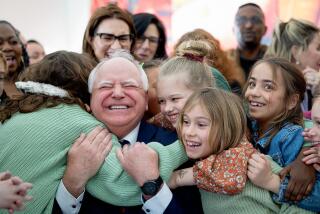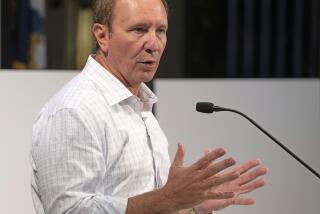Wilder’s Political Travels Stir Talk of ’92 Ambitions
- Share via
SIOUX CITY, Iowa — Not content with blazing a trail to statewide office that other black politicians are striving to follow, Virginia Gov. L. Douglas Wilder is stumping the country in an undeclared but undeniable bid for a place on the national Democratic ticket in 1992.
Of even broader consequence than Wilder’s personal ambitions is his determination to cut the Democratic Party free from its traditional liberal moorings and steer it toward the political mainstream. This is the course Wilder and many others believe Democrats must travel if they are ever to regain the White House.
Wilder’s status as the nation’s first black elected governor made him a celebrity last November. Now his conservative economic views are making him a much sought-after asset on the 1990 campaign trail.
“The Republicans are going to try and label us as taxers and spenders,” said John Roehrick, the Iowa Democratic chairman whose invitation brought Wilder here to campaign Friday and Saturday for the party’s gubernatorial and U.S. Senate candidates. “With Wilder we can blunt that attack, because he has shown he doesn’t believe in spending money he doesn’t have.”
By virtue of his own electoral breakthrough, Wilder also brings a message of hope to this economically hard pressed farm state. “He makes Iowa farmers feel they can still make it here in America,” said Mike Earll, Democratic candidate for the local congressional seat, after hearing Wilder rouse a small but enthusiastic crowd at a Sioux City community center.
Wilder’s five-city swing through Iowa, where the 1992 presidential nominating process will begin, was only the latest in a series of visits to strategic political locations. Two weeks ago, he toured New Hampshire, the first presidential primary state, and before that he visited, among other places, New York, California and Illinois.
“People say you’re making noise now when you don’t have to,” Wilder said. “But I think you have to make noise because the wagon that makes the noise gets the grease.”
Wilder’s wagon is getting national attention in large measure because of the sharp differences in background, style and substance between him and two-time presidential candidate the Rev. Jesse Jackson, the favorite son of black voters in the last two presidential races.
Wilder came up in politics the old-fashioned way, paying his dues first as state senator then as lieutenant governor. Jackson, plunging into politics from the civil rights movement, had been schooled in the tactics of the street rather than the back room.
In contrast to the charismatic 48-year-old Jackson’s confrontational style and strident rhetoric, the courtly, 59-year-old Wilder preaches the politics of reconciliation and harmony. “It’s to a lot of people’s advantage to say that the system doesn’t work,” he said. “I happen to believe that it does.”
“He frees up the debate within the party and makes it easier for Democrats to develop a broader message,” pollster Stanley Greenberg said. “I think there is a collective sigh of relief every time he opens his mouth.”
Wilder’s low-keyed, practical approach appeals not only to whites who are weary of racial controversy but also to a good many blacks who see him as having the practical experience Jackson lacks.
“I know what this man has done in politics,” said Bea Underwood, a Democratic National Committee member from Minnesota, after hearing Wilder speak at Minneapolis’ Hubert H. Humphrey Institute.
“If people want to win in politics, they have to come to the mainstream,” said Hansel Hall, a Minneapolis businessman. “I would vote for Wilder over Jackson based on his background.”
Wilder’s new prominence on the national political stage appears to give Democrats more flexibility in trying to resolve their central dilemma: how to maintain their grip on blacks and other interest groups while reaching out to the middle-class voters who have been steadily drifting away since the social and racial turbulence of the 1960s.
As a black governor, “he gives a degree of credibility to the mainstream message that other conservative Democrats can’t get,” said Al From, executive director of the Democratic Leadership Council, a group of moderate-to-conservative party leaders. “What he is doing is responding to the feeling that middle-class voters have had for the past 20 years: that Democrats are inattentive to their economic needs and hostile to their values.”
Wilder argues that Democrats need to focus on problems, not interest groups. “We have to stop looking at segments of the party and saying that this program is for this group and that program is for that group,” he said in an interview. The vast majority of the American people aren’t going to vote by group, they are going to vote by issues.”
Wilder also has the potential for easing the tensions between two of the party’s most important constituency groups--blacks and Jews. They were once staunch allies, but such issues as racial quotas and the plight of Palestinian refugees in the Middle East have made them occasional adversaries.
Addressing a Washington meeting of the American Israel Public Affairs Committee two weeks ago, Wilder put himself firmly on the side of “those who believe Jerusalem should be the undivided capital of Israel.” He also called for an end to U.S. talks with the Palestinian Liberation Organization, an action that President Bush took last week.
Wilder’s remarks brought the audience to its feet, cheering and whistling.
Although Wilder insists that “my intentions are to finish my term of office,” which runs through 1993, his heavy travel schedule inevitably stirs speculation about his future ambitions, particularly here in Iowa, a critical early battleground for Democratic presidential prospects.
“I believe Gov. Wilder when he says he came here to campaign for me,” Don Avenson, Democratic candidate for governor of Iowa, told the crowd at the community center rally here. “But I’ll tell you this, if he does run for President, he’ll make a damn good one.”
Standing at the back of the hall, Wilder’s chief political adviser, Virginia party chairman Paul Goldman, a fast-talking native New Yorker with a reputation as a canny manipulator, could not have been more pleased. “That’s Wilder’s first endorsement,” Goldman told a reporter.
Wherever he goes, Wilder spreads the gospel of what he calls the “New Mainstream.” He defines it as “a forward-looking blend of fiscal responsibility and social conscience” designed to “provide ever-expanding opportunities to all individuals and their families.”
On the social conscience side, Wilder can point to his championship of abortion rights, which was the key issue in his narrow election victory. As governor, he cites his establishment of a commission to look into disparities in the state’s educational system, appointment of a number of blacks to key state posts and an executive order requiring state agencies and institutions to divest themselves of investments in South Africa.
Yet Wilder’s record as governor seems more impressive on the frugality side. Instead of proposing new programs in the traditional liberal manner, he pushed through budget cuts for most state agencies. This made possible the creation of a $200-million “rainy day” fund that can serve either as a cushion if revenues fall off or as a way to fund new programs in the second year of his term.
He takes pride in having prodded the Virginia Legislature into repealing the state’s sales tax on prescription drugs. His answer to any proposals for new taxes, state or federal, is that he would rather first cut spending--he claims billions could be saved over the years by trimming the space program--and accelerate economic growth.
“Economic development is the greatest of our social equalizers,” he contended. “As long as we can keep the economic engine grinding, we can find the largess with which to fund most of our social programs.”
So conservative do Wilder’s economic views seem that some voters might find it hard to distinguish between his New Mainstream and Republican doctrine.
To understand the difference, Wilder says it is necessary to look at the Republican record in the White House since 1981. “They have no history of reaching out to all the people and doing things constructively,” he said, citing environment and education as cases in point.
“Bush’s record speaks for itself because he inherited the (Ronald) Reagan years,” Wilder said. “He is charged with the Reagan years to the extent that he hasn’t changed them--and he hasn’t changed them.”
Whatever the future, Wilder’s success in capturing the governor’s office in the old capital of the Confederacy has already provided lessons and encouragement to other black politicians. Most notable among those on the ballot this fall are Harvey Gantt, challenging Republican Sen. Jesse Helms of North Carolina, and Andrew Young, seeking the Democratic nomination for governor of Georgia.
But for now, Wilder has only one serious rival among black political leaders on the national stage--Jesse Jackson.
Together in public, the two men are as cordial as old college fraternity brothers, which they happen to be. Denying any friction between him and Wilder, Jackson said: “Those people who have room for only one black in their mind at a time must have a pea for a brain.”
Some of Jackson’s advisers, though, appear to harbor misgivings about Wilder’s sudden emergence to prominence.
Steve Cobble, a 1988 Jackson campaign strategist and former executive director of his political action committee, worries that Wilder could play a “spoiler” role in the 1992 presidential campaign by winning enough black votes to ruin Jackson’s chances of winning a majority of delegates.
Jackson aside, the course Wilder is following is not without risks.
His chance for impact on the national scene depends heavily on his performance in Richmond. Should things go wrong there, he would be accused of neglecting his responsibilities to pursue his ambitions. Said University of Virginia political scientist Larry Sabato: “All it would take is one good jail break when he’s out of the state.”
More to Read
Get the L.A. Times Politics newsletter
Deeply reported insights into legislation, politics and policy from Sacramento, Washington and beyond. In your inbox twice per week.
You may occasionally receive promotional content from the Los Angeles Times.










